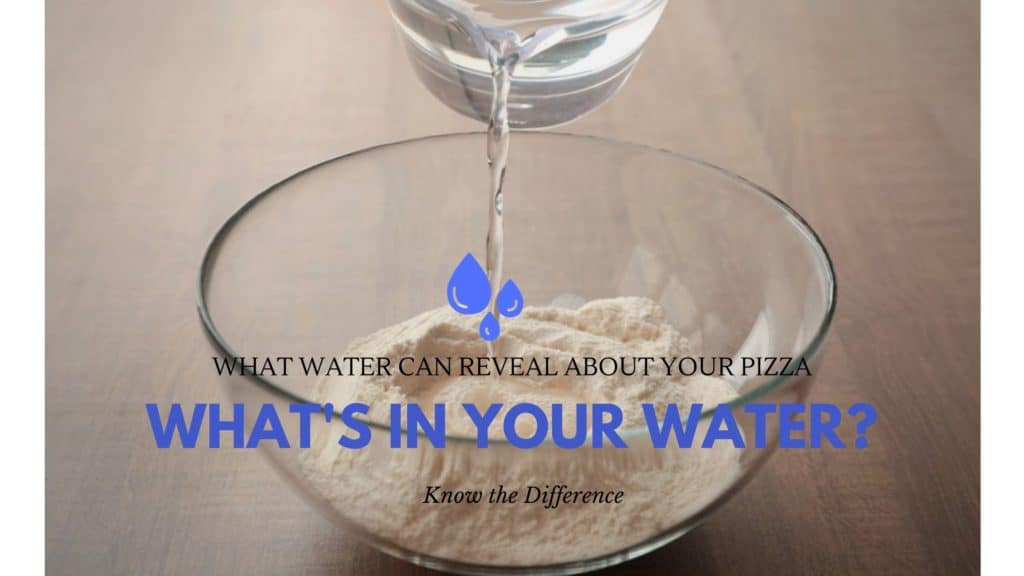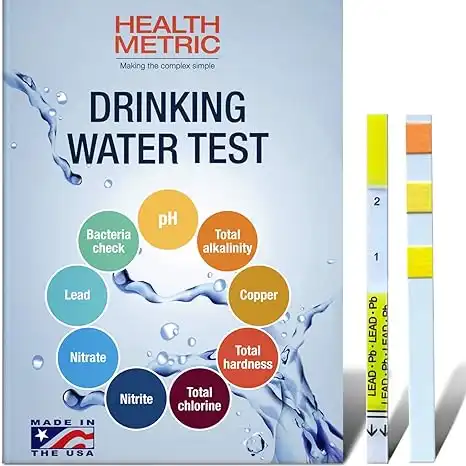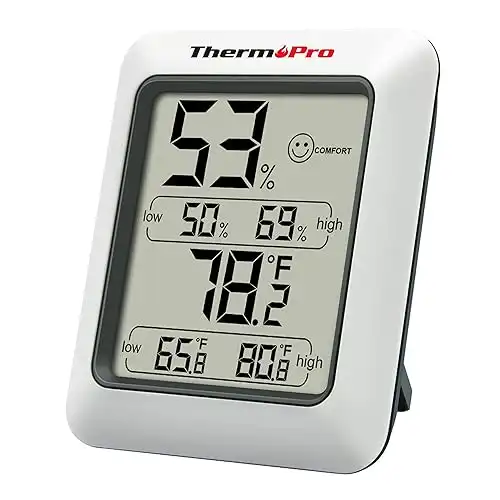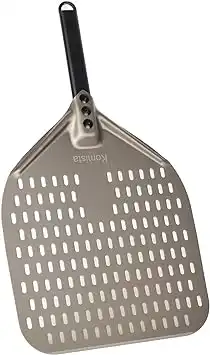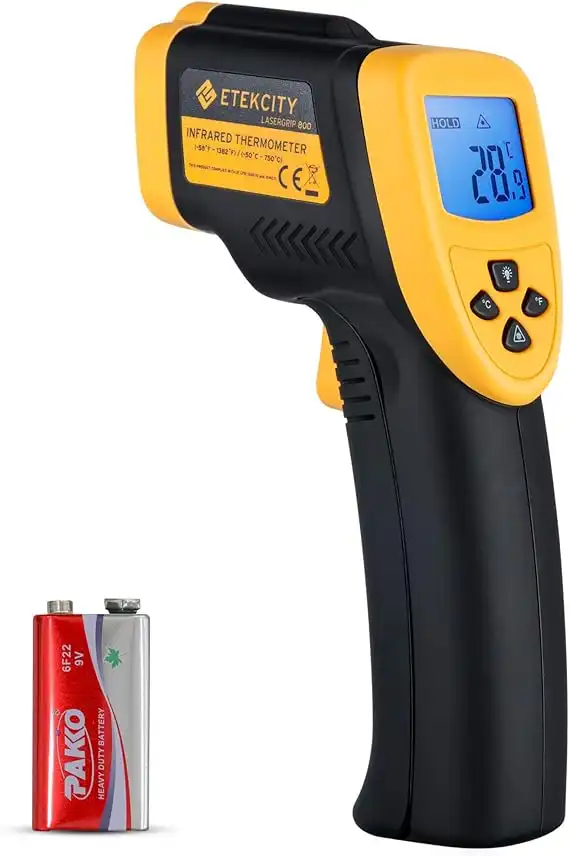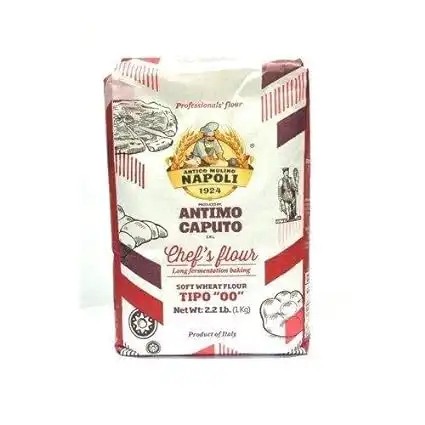What is the Best Water for Pizza Dough?
Have you ever wondered why your homemade pizza dough never quite reaches the lofty heights of your favorite pizzeria’s crust?
The secret may be hiding right under your nose or flowing from your kitchen tap. The key to a mouthwatering, crispy-on-the-outside, tender-on-the-inside pizza crust lies in the water you use!
But don’t worry; we’ve got you covered.
This post is your ultimate guide to understanding the importance of water temperature, quality, and hydration in your quest for the perfect pizza dough.
Uncover this essential ingredient’s mysteries, find the best water for pizza dough, and soon you’ll be wowing friends and family with your pizzeria-worthy creations.
So, let’s get started.
Here’s What You Will Find:
Key Takeaways
Best Water for Pizza Dough
Quality Matters: The water you use for your pizza dough should be clean and free from off-tasting or odors. This ensures it won’t negatively impact the flavor of your dough.
Temperature is Key: Water for pizza dough should be lukewarm, ideally between 105-110°F (40-43°C), particularly if you’re using active dry yeast. Too hot can kill the yeast; too cold might not activate the yeast properly.
Tap Water is Usually Fine: Most tap water is suitable for making pizza dough, provided it tastes good. If tap water has high chlorine content or an unpleasant taste, consider using filtered or bottled water instead.
Optional Upgrade – Bottled Water: Some bakers prefer using bottled natural spring water for its balanced mineral content and consistent taste. Brands like Evian or Fiji are often chosen, but the best-bottled water can depend on your personal preference and the flavor profile you’re aiming for. Remember, bottled water is optional and unnecessary for making great pizza dough.
Best Water for Pizza Dough
Water— a key ingredient often overlooked but vital to the perfect crust. The best water for pizza dough is clean, tastes good, and is at the right temperature.
Whichever water you choose, it is integral to achieving the right dough hydration level, significantly influencing the dough’s texture and the finished crust’s quality.
Water plays a crucial role as a hydrator, temperature regulator, and flavor enhancer. Discover the optimal quality and temperature for water in your dough and how to nail the perfect hydration percentage.
Understand these elements, and you’re one step closer to achieving pizza perfection.
Best Water Quality
In terms of quality, if your tap water tastes good and is free from any strong flavors or odors, it’s suitable for making pizza dough.
However, if your tap water has a high chlorine content or any off-flavors, it may interfere with yeast fermentation and dough flavor. In these cases, using filtered or bottled water can be beneficial.
In some styles of pizza, particularly Neapolitan pizza, some chefs swear by using mineral water due to its unique mineral content, but this is generally considered an extra step for the purist and not necessarily a requirement for great pizza dough.
The most important factor is that the water is clean, tastes good, and is at the right temperature to activate your yeast.
Best Water Temperature
The best water for pizza dough is typically lukewarm tap water, which is usually sufficient for most home bakers. It’s essential that the water is not too hot as it can kill the yeast, with the ideal temperature being between 105-110°F (40-43°C) for active dry yeast. Speaking of fermentation, aim to maintain an ambient temperature of around 80°F to ensure the dough develops a beautifully rich and complex flavor.
Best Hydration Percentage
Regarding hydration, a 65% water-to-flour ratio is the sweet spot, balancing pliability and structure for an irresistible texture.
Lastly, don’t fret too much about water quality—any safe and enjoyable water should be more than sufficient for your pizza dough.
By keeping these crucial factors in mind, you’ll be well on your way to pizza dough perfection.
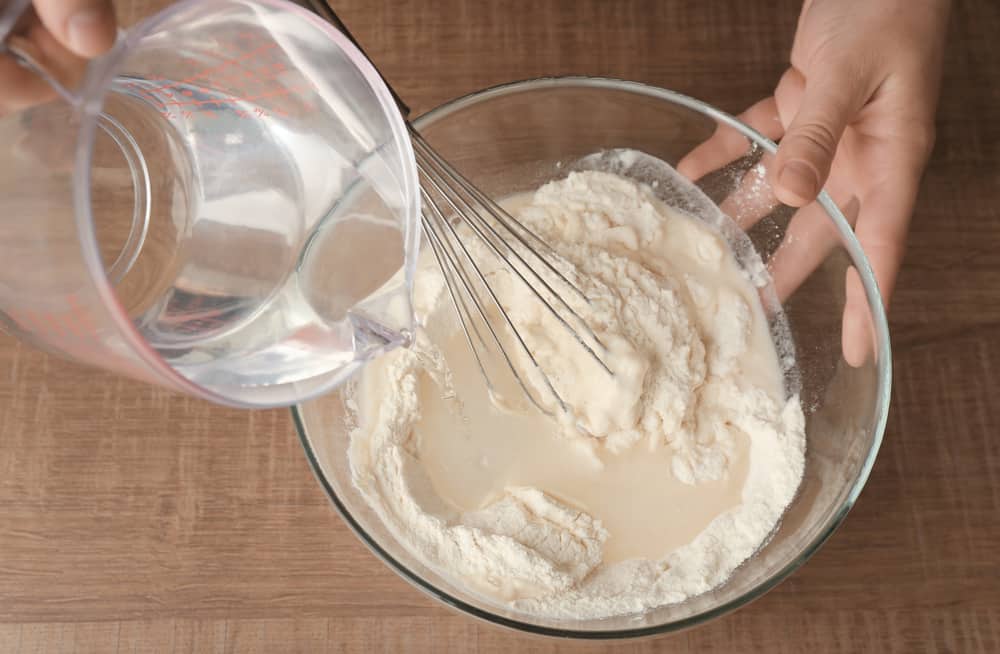
Unlocking the Perfect Pizza Dough
Best Water for Pizza Dough
Temperature, Fermentation, Hydration, and Water Quality
Quick Reference
Pizza Dough Water Temperature – The best water temperature for pizza dough is 95F to 105F to ferment the yeast.
Fermentation – The best temperature to ferment pizza dough is 80F.
Pizza Dough Hydration – The best water hydration for pizza dough is 65%.
Pizza Dough Water Quality- Any water that is good enough to drink will be good enough for pizza dough.
What is the Role of Water in Pizza Dough?
The role of water in pizza dough is multifaceted, serving as a vital component for hydration, gluten development, and yeast fermentation. Water helps bind and hydrate the flour, creating a cohesive dough that is pliable and elastic.
It also aids in the formation of gluten, giving the dough structure and strength.
Additionally, water activates the yeast, facilitating fermentation and contributing to the dough’s flavor and texture.
We are looking for flavor to satisfy our taste buds and be happy.
So, why do we add water if water doesn’t have any flavor?
Precisely, the flavor in a pizza crust comes from flour, salt, and yeast.
Depending on the grain, the flour will have different flavors; the yeast fermentation process sets the tone, and the salt brings that tone to another level.
All these elements are naturally dry, so we needed to figure out how to combine them without changing harmony. What ingredient is better other than water?
It certainly doesn’t bring any flavor to the equation, but it acts as a binding agent, like the orchestra conductor that brings all his artists together for the perfect symphony.
The orchestra conductor doesn’t play any instruments, but there wouldn’t be a concert without them.
Water is an essential ingredient in pizza dough, crucial in determining its overall quality and characteristics.
Pro Tip
If you know you are dealing with hard water, then try to add less salt to your dough, on the contrary, if you have soft water, add more salt to your dough.
Does Water Make a Difference in Pizza Dough?
Yes, water does make a significant difference in pizza dough. While it may seem like a simple, unassuming ingredient, water plays a crucial role in the dough’s hydration, gluten development, and fermentation process.
The temperature, quality, and quantity of water used can greatly impact the dough’s texture, elasticity, and flavor profile.
By optimizing these factors, you ensure your pizza dough achieves the perfect balance between crispness and tenderness, ultimately elevating your homemade pizza to new culinary heights.
So, don’t underestimate the power of water—give it the attention it deserves, and watch your pizza dough transform!
After flour, water is the second most significant component of pizza dough.
- Water gets absorbed by the flour, swells up the flour’s starches, and makes the dough sticky.
- Water triggers gluten formation, creating a firm structure in pizza dough.
- Water activates the yeast, so it can begin to grow.
- Hard water with a high mineral content can make your dough tough, while soft water has the opposite effect, causing your dough to be too relaxed.
Accordingly, the best water for pizza dough you use will undoubtedly make a difference in the final result of your crust.
What are the three fundamental components of water that you need to control to make pizza dough?
There are three factors that you need to take very seriously when making pizza at home:
Volume
Temperature
Water Quality
Pizza Dough Water Volume
The volume will measure the amount of water we will introduce to our dough. Depending on how much water you add, there will be a direct effect on the result of your crust.
This water content is known as hydration.
To find which is the best water for pizza dough, you must determine what the correct amount for your taste.
We give you some parameters, but maybe you don’t like the results. You can quickly go up or down on these numbers to reach your own.
Pizza Dough Water Temperature
Pizza dough water temperature is pivotal in achieving the ideal dough consistency and activating the yeast for proper fermentation. The optimal water temperature range for pizza dough is between 95°F and 105°F. Within this range, the yeast thrives, ensuring an even rise and well-developed flavor.
Too hot or too cold water can hinder yeast activity, leading to inconsistent results or even dough that fails to rise. By carefully monitoring and maintaining the appropriate water temperature, you set the stage for a perfect pizza dough that boasts the right texture, elasticity, and taste balance.
If the water is too cold, it will take forever to ferment.
On the other hand, if the water is too hot, it could kill the yeast and not ferment at all.
When activating the yeast for pizza dough, the water should be around 95F to 105F.
Pizza Dough Water Quality
The quality of water used in pizza dough can impact your final product’s overall flavor and texture. While it might not be the first thing that comes to mind, water quality should not be overlooked. Any water that is good enough to drink will generally be suitable for pizza dough.
Tap water, filtered water, or bottled water can all produce excellent results if they are free from impurities or off-flavors that could negatively affect the dough.
In some cases, highly chlorinated tap water may slightly impact the dough’s fermentation process, but filtered water can easily mitigate this. You’ll be one step closer to a delicious, pizzeria-worthy crust by ensuring you use high-quality water in your pizza dough.
Pizza Pun
What do you call a sleeping pizza?
PiZZZZZZa.
What’s in Your Water?
There are three factors professional pizza makers take into consideration concerning the best water for pizza dough these are:
- Hardness
- Purity
- Acidity
Hardness
The hardness is measured to be determining the mineral content in the water. The minerals in your water can directly affect yeast fermentation and the texture of your dough.
Hard water is rich in minerals, usually calcium and magnesium.
For the yeast to live and grow, it needs these minerals to grow faster in hard water.
Acidity
Pure water is considered neutral and has a PH of about 7. That means it’s neither acidic nor alkaline.
PH Scale
Most tap water ranges from 6.5 to 8 on the pH scale and works fine for pizza dough.
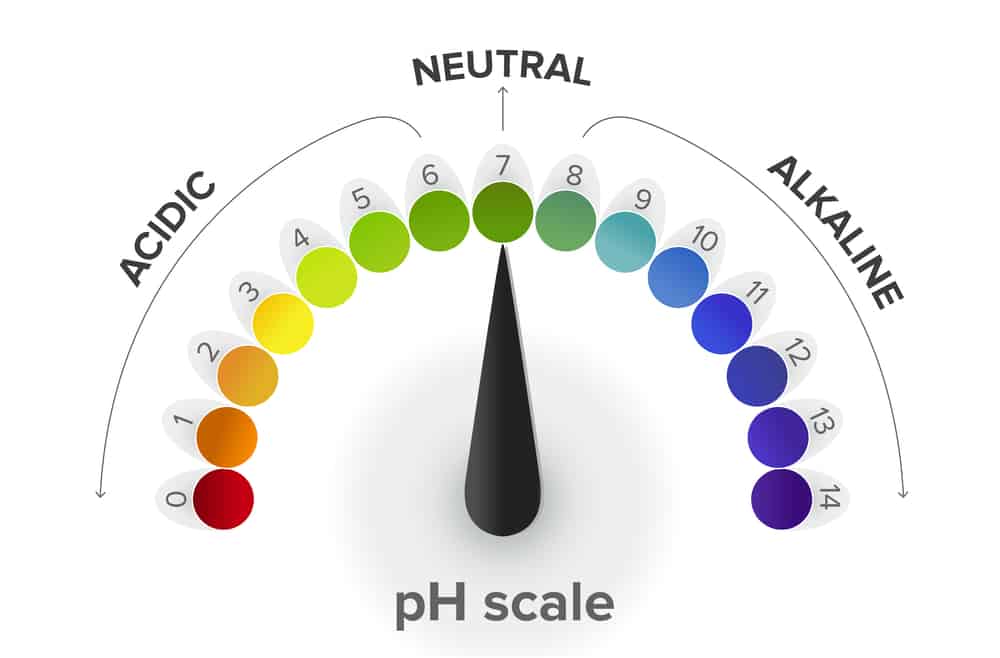
Purity
The Environmental Protection Agency (EPA) defines “pure water” as water free from all types of bacteria and viruses.
But there is more to purity than just that. Water is a compound made up of hydrogen and oxygen, so pure water would be water that contains nothing but hydrogen and oxygen.
However, pure water of this sort typically doesn’t exist except in controlled environments. For homemade pizza, we are not going to worry about it.
So, if you want to know what’s in your water, just buy a water purity test kit to check the purity of your water.
These tests typically measure chlorine, nitrates, nitrites, minerals such as iron, copper, and lead, and the hardness of your water.
Check the EPA’s guidelines on testing your water here.
Here is the Water Purity Test the PRO’s at Homemade Pizza Pro Use and Recommend
You don’t need a science degree or a lab to test your water with this kit. This tests are easy to use at home, and you’ll get most of your results in just a few minutes.
Best Water for Pizza Dough – FAQs
What Kind of Water Should You Use for Pizza Dough?
Most tap water will be fine for making pizza dough. Just follow a simple rule; if your water is good enough to drink will be good enough for pizza.
Take a sample of your water; if it has a high chlorine content or is too hard, buy purified drinking water.
Can You Use Bottled Water for Pizza Dough?
Any bottled water should be good enough, except mineral water.
Mineral water doesn’t have the minerals necessary for the yeast to grow, ferment, and develop flavor.
Best Bottled Water for Pizza Dough
If you prefer to use bottled water for your pizza dough, it’s best to choose natural spring water due to its balanced mineral content, which can add a nuanced flavor to your dough. We prefer brands like Evian or Fiji, which are known for their quality and consistent taste.
However, the “best” water can be subjective and depends on personal preferences and the specific flavor profile you’re aiming for. Some bakers might prefer water with higher mineral content, such as San Pellegrino, to enhance the complexity of the dough’s flavor.
It’s also worth noting that using bottled water for baking is more of an optional upgrade rather than a necessity. Most tap water (provided it tastes good and is safe to drink) or filtered water will work just fine for making quality pizza dough.
We did the homework, and Aquafina is one that has the least minerals in it, so we try to avoid it for making pizza.

What is Pizza Dough Hydration?
Pizza dough hydration is the ratio of water to flour in the dough, expressed as a percentage. It is crucial in determining the dough’s texture, elasticity, and overall handling properties.
A higher hydration level results in a wetter, more pliable dough that produces a lighter, airier crust, while lower hydration yields a stiffer dough with a denser crumb.
The ideal pizza dough hydration generally falls around 65%, striking a perfect balance between pliability and structure. By carefully adjusting the hydration level of your pizza dough, you can achieve the desired texture and mouthfeel, ultimately crafting the perfect crust for your homemade pizza.
Check our article on pizza dough hydration per pizza style to learn how to adjust hydration depending on the pizza style you want.
Pizza dough hydration is the amount of water in the dough relative to the flour by weight.
Mixing 100 grams of flour and 65 grams of water, the dough hydration is 65% (65 ÷ 100).
Here’s a video on what is pizza dough hydration presented by Ooni.
To learn more about pizza dough hydration, check our article: Pizza Dough Hydration – Mastering the Art of the Perfect Crust.
How Do You Calculate Hydration for Pizza Dough?
To calculate hydration, you divide the total weight of water by the total weight of flour; the result will be a decimal number that you will multiply by 100 to get the percentage.
Remember, Flour is always 100%, so that will be our base or denominator.
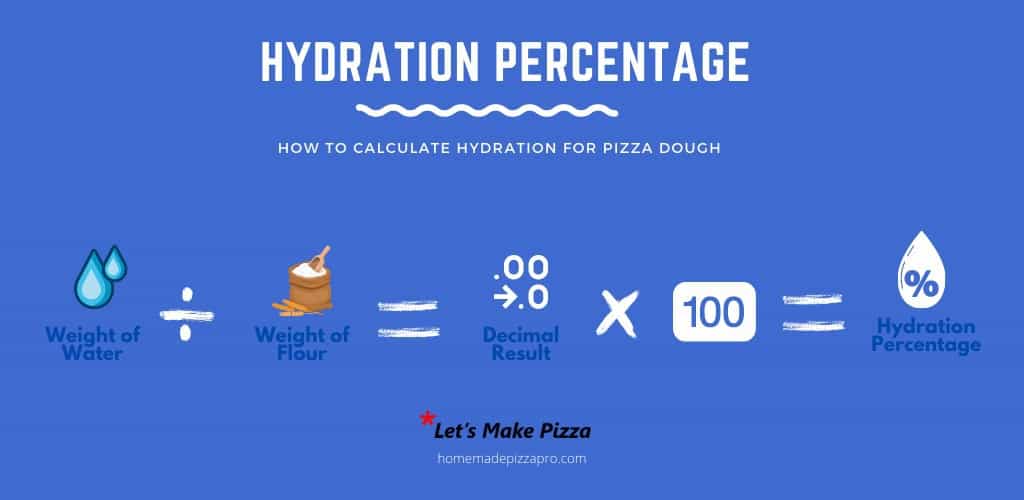
To make things easy and you don’t have to deal with fractions.
We’ve created a Baker’s Percentage Calculator where all you have to do is enter the weight of your ingredients, and you will find out the percentage in a second.
What is the Best Hydration for Pizza Dough?
The best hydration for pizza dough is 65% for most baking conditions. Hydration will vary according to the baking temperature.
For example, true Italian pizzaiolos use pretty low hydration, ranging from 55% to 59%.
However, that is because they use wood-fired ovens that reach temperatures up to 950°F.
Such heat evaporates the water quickly, and the dough firms up quickly, creating a beautiful, crisp yet foldable crust.
On the other hand, if you have hydration of 75% or more and bake the pizza in your home oven at 500°F, it will take from 20 to 30 minutes to cook.
Since the water content is so high, evaporating will take much longer. The longer baking time will cause your crust to be soggy and chewy.
The water inside the dough is what creates the hole structure in your pizza crust.
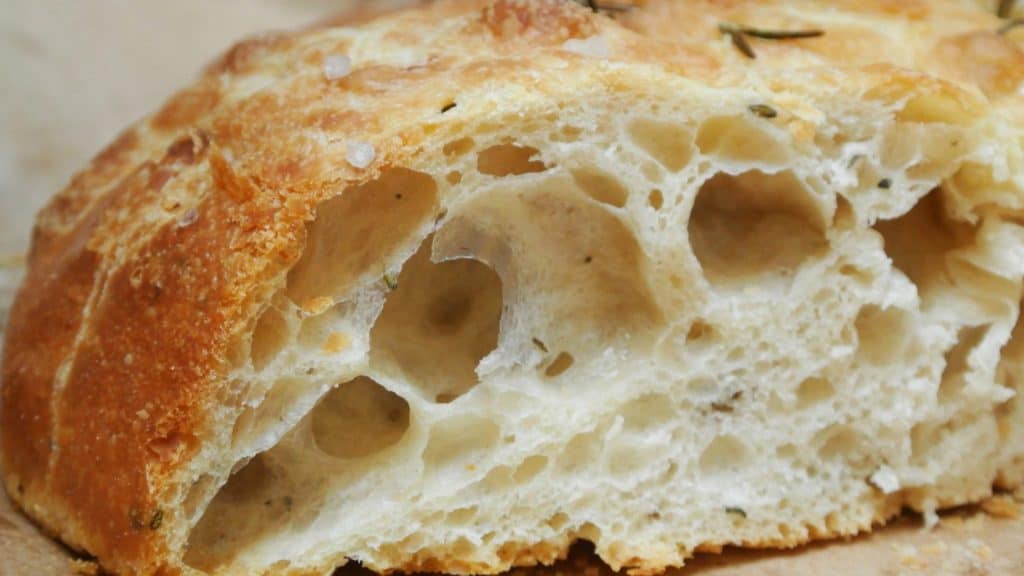
In high-hydration doughs, all that steam building up inside the hot dough expands the bubbles, creating an airier structure in the finished crust.
On the other hand, soft water can make for slow-rising dough with a weaker gluten structure.
Why 65% Hydration is Best for Pizza Dough?
- The results that 65% hydration brings to the crust are phenomenal.
- 65% Hydration is the average hydration of all yeast bread, so if you are a bread baker, you are probably familiar with this percentage.
We are adapting professional pizza baking rules from the Associazione Verace Pizza Napoletana for home use.
They typically suggest less hydration, they range from 50 to 59%, but that is because they use ovens that reach up to 950°F.
We found that for homemade pizza in the average kitchen oven that can only reach up to 500°F, 65% provides extraordinary results.
What is High Hydration Pizza Dough?
High hydration in pizza dough is considered any hydration over 65%.
Remember that 65% is the average percentage for any yeast dough, so anything above that will be regarded as high.
Your percentages are different for all those bread bakers out there; we get it.
What you consider high hydration might be different. But here we are making homemade pizza, not bread.
High hydration doughs will take longer to cook in the average kitchen oven. It also will have a direct effect on the result of your crust.
Do You Use Hot or Cold Water for Pizza Dough?
To make pizza dough, it’s better to use warm water at 95 degrees F so that the yeast can activate faster.
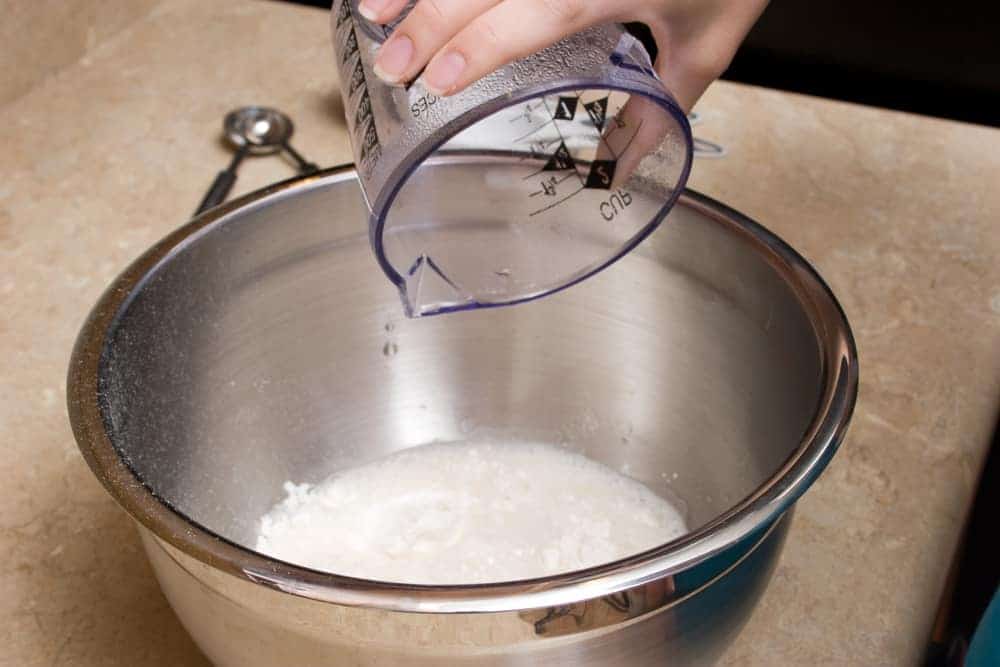
What Happens if You Add Too Much Water to Pizza Dough?
When you add too much water to your dough:
- It will take longer to bake as all that water needs to evaporate. The average kitchen oven only reaches temperatures up to 500°F, so prepare yourself to wait for your pizza to be done in 20 to 30 minutes. Using a wood-fired or gas oven, you can get temperatures up to 950°F. In those instances, the cooking time will be reduced significantly.
- The texture of your crust will probably be soggy and chewy rather than crisp and firm. At the end of the day, it is a matter of taste and what you like. Experiment and try different hydration percentages to see which you prefer.
Humidity Effect on Pizza Dough
Humidity is an additional source of hydration for your pizza dough.
Is measured by a formula called “Hydroscopic”, which tells you how much humidity a substance can absorb from its surrounding, in this case, flour.
But this is too scientific.
In simpler terms:
You add water to flour to make the dough, but flour also absorbs water from the air. A humid environment will make your dough wetter. So, you must be careful if you have a humid kitchen.
How Room Temperature Affects Your Pizza Dough
There is no exact temperature that defines what room temperature is.
The American Heritage Dictionary of the English Language identifies room temperature as around 68°–72°F.
Depending on what your kitchen temperature is, it will determine how long the first fermentation will take if you are fermenting at room temperature.
Cold Water
The yeast will take longer to ferment in a too-cold kitchen.
Hot Water
In a hot kitchen, the yeast will ferment faster.
The average temperature at the first fermentation should occur should be around 80°F.
Unless you live in Florida, your kitchen will probably be less than 80°F.
Most kitchen ovens these days have a “Proofing” setting that is around 80°F for most ovens.
Having a humidity meter in your kitchen and a thermometer is very useful.
We recommend the ThermoPro TP50 because it gives kitchen temperature and humidity readings.
Humidity meter with humidity level icon indicates air condition -- DRY/COMFORT/WET, allowing this humidity sensor to ensure you’re always aware of changes to your home/household with just a quick glance
Effect of Steam on Pizza Dough
It is fair that we discuss the effects of steam on your pizza dough.
Because what happens when you set the pizza in the oven? Immediately, the water starts evaporating and starts creating steam.
The amount of water in your dough also affects how much the crust will rise.
More Water = More Puff
When the water heats up in the oven, it creates steam, especially when the pizza first goes in the oven.
Steam helps transfer heat to the dough faster, giving it an initial blast of heat that will puff the dough quickly. Professional bakers call this oven spring.
More water in the dough gives a better oven spring.
You can inject some steam into the kitchen oven by adding a couple of ice cubes to the bottom of the oven or spraying water on the oven walls right after you set the pizza in the oven.
How Do You Rehydrate Pizza Dough?
When the pizza dough is left uncovered or exposed to air for an extended period of time, it dries and develops a crust.
This crust or shell encasing the dough ball breaks when you pull it apart. At this point, the dough is not good for making pizza as it will not expand to make the crust properly.
To rehydrate the dough ball, you can get a small container with water, and with your hand, you tap or sprinkle water on the dough ball.
You can also use a bottle sprayer for this, which is what we think is the best solution. Spray some water over the dough, cover it, and let sit at room temperature for about 1 hour.
The dough will absorb the water, hydrate, and be good for pizza again.
How Does Water Temperature Affect Your Pizza Dough?
The water temperature will affect the fermentation process of the yeast.
Activating Yeast
In a hot kitchen, the yeast will ferment faster. When activating the yeast, the water should be from 95°F to 105°F; if the water is hotter, it will kill the yeast, and the dough will not ferment.
Additional Resources on Water for Pizza Dough
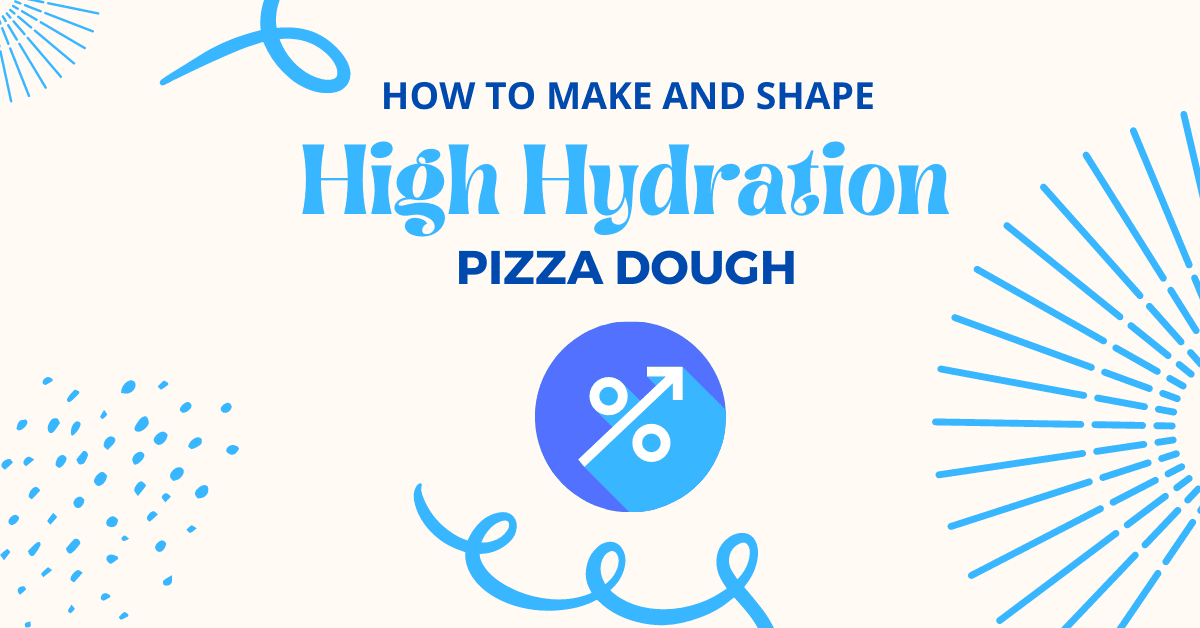
High Hydration Pizza Dough – Secret Ingredient to Perfectly Crispy Pizza
the PROs
Are you looking for a delicious, crunchy high hydration pizza dough recipe? This type of dough is very popular among …
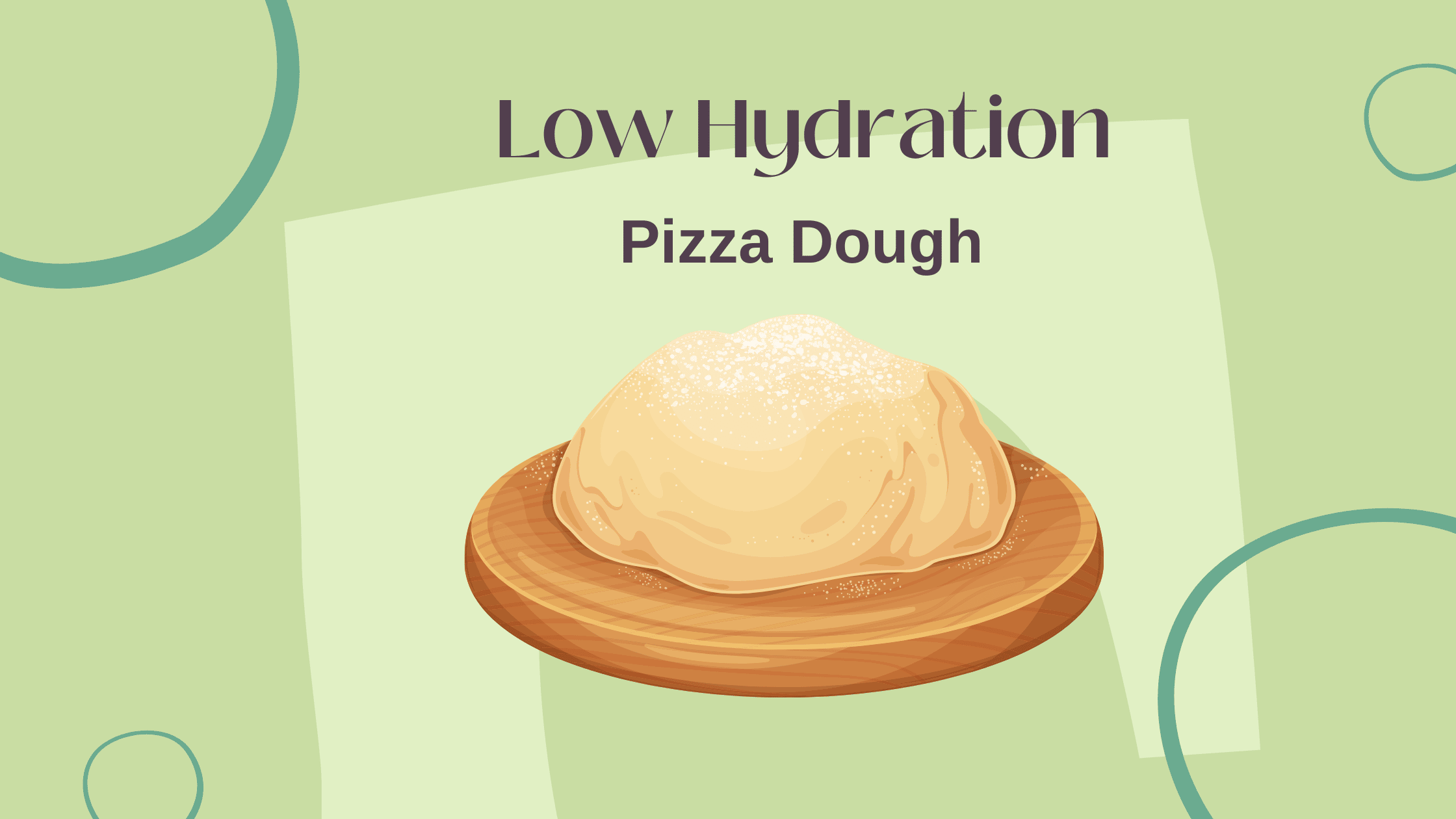
Low Hydration Pizza Dough: No More Soggy Pizza!
the PROs
Are you wondering what low-hydration pizza dough is? A pizza dough’s hydration is one of the most important factors when …
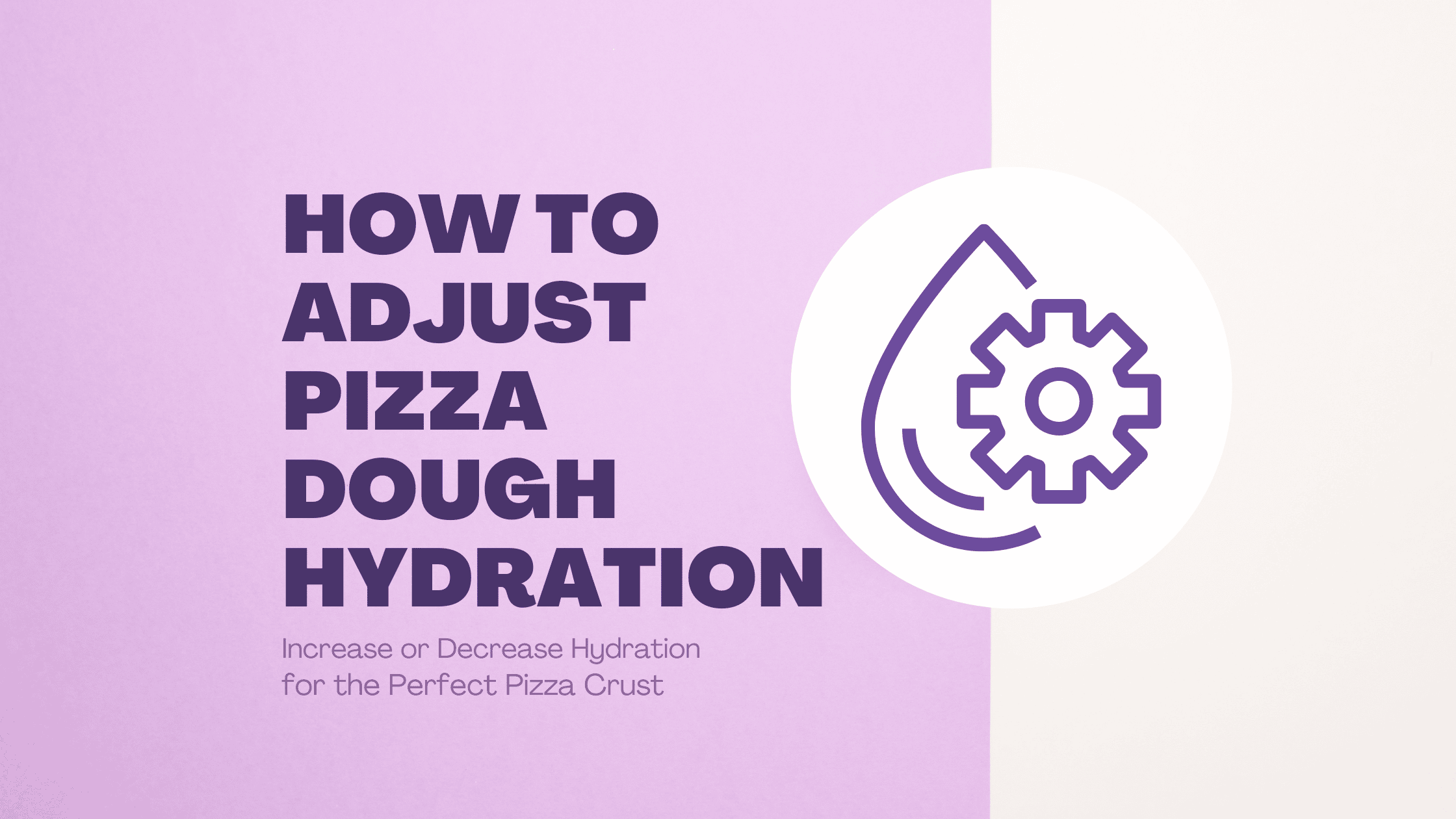
How to Adjust Pizza Dough Hydration Levels for a Perfect Crust
the PROs
How to Adjust Pizza Dough Hydration Making good pizza dough is an art form and one of the most important …
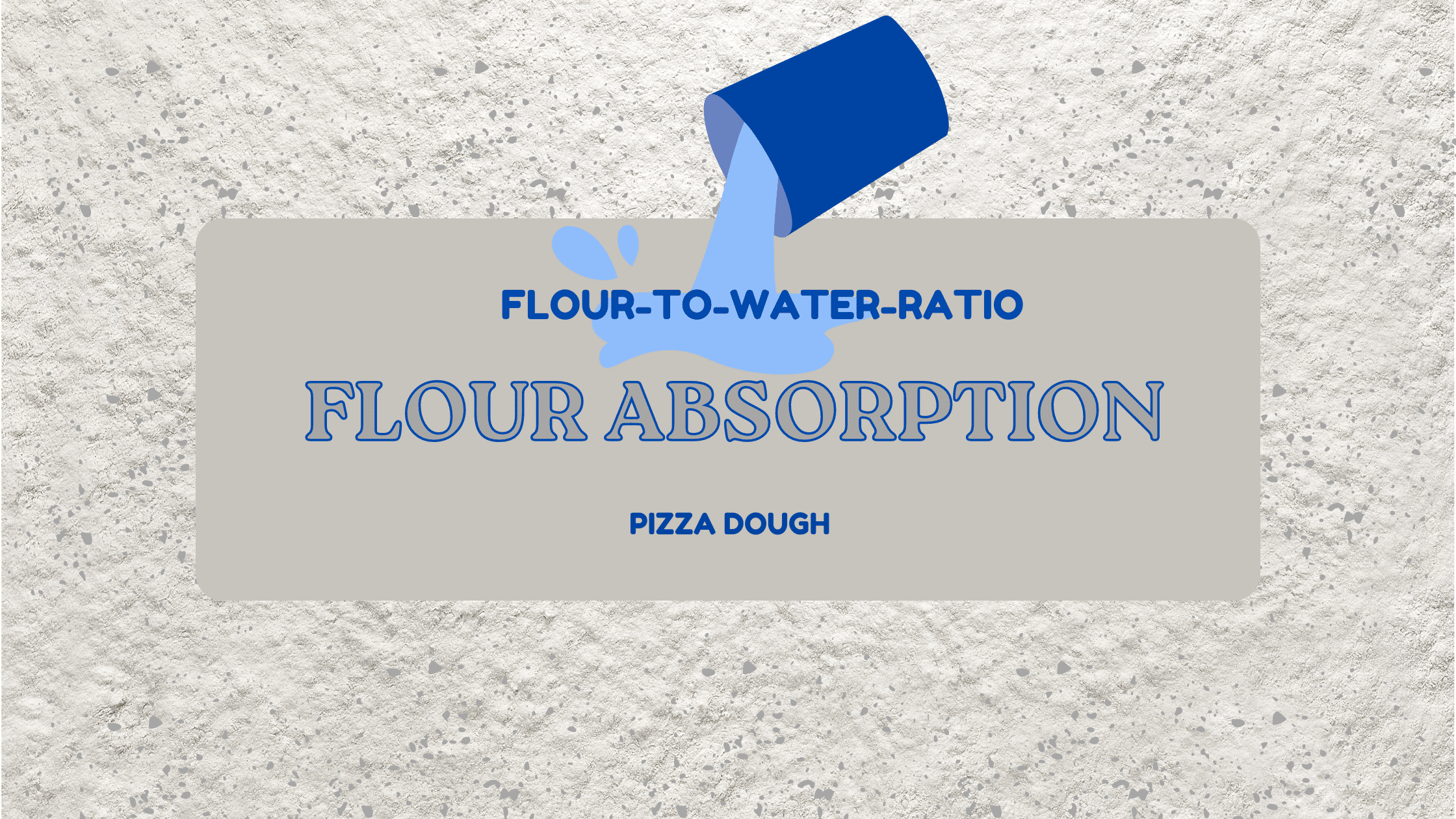
Flour Absorption 101: The Key to Crafting the Perfect Pizza Crust
the PROs
Ah, pizza. The one food that unites us all! What would we do without our delicious, cheesy slices of heaven? …
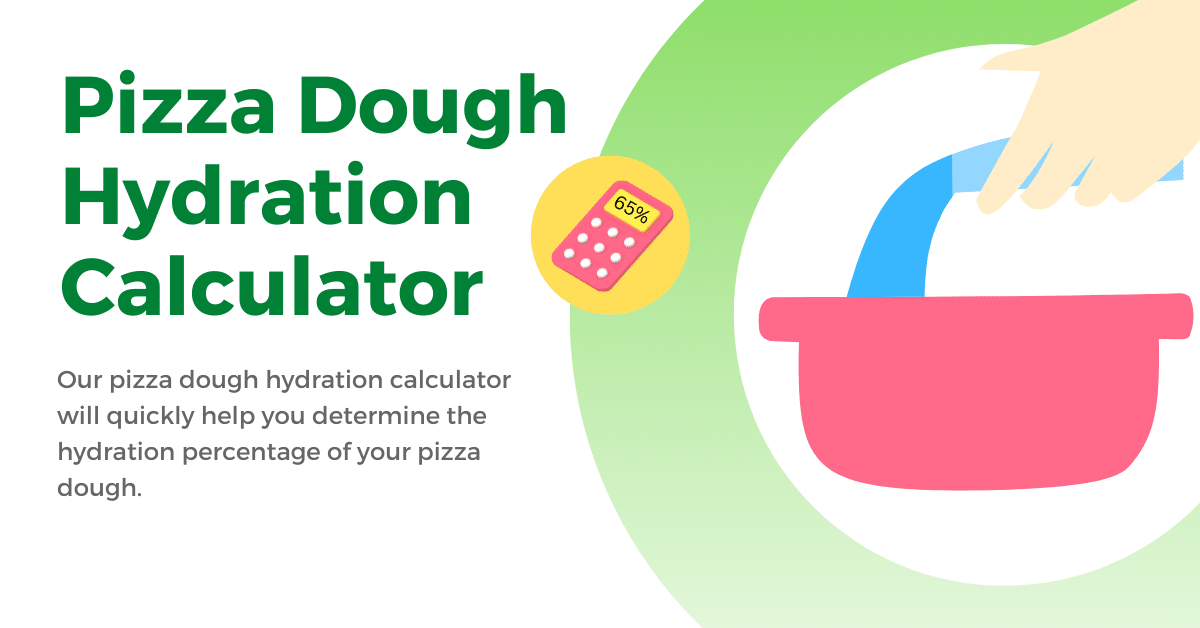
Pizza Dough Hydration Calculator
the PROs
Making the perfect pizza dough can be difficult, especially for novice bakers. But with the right tools, anyone can master …
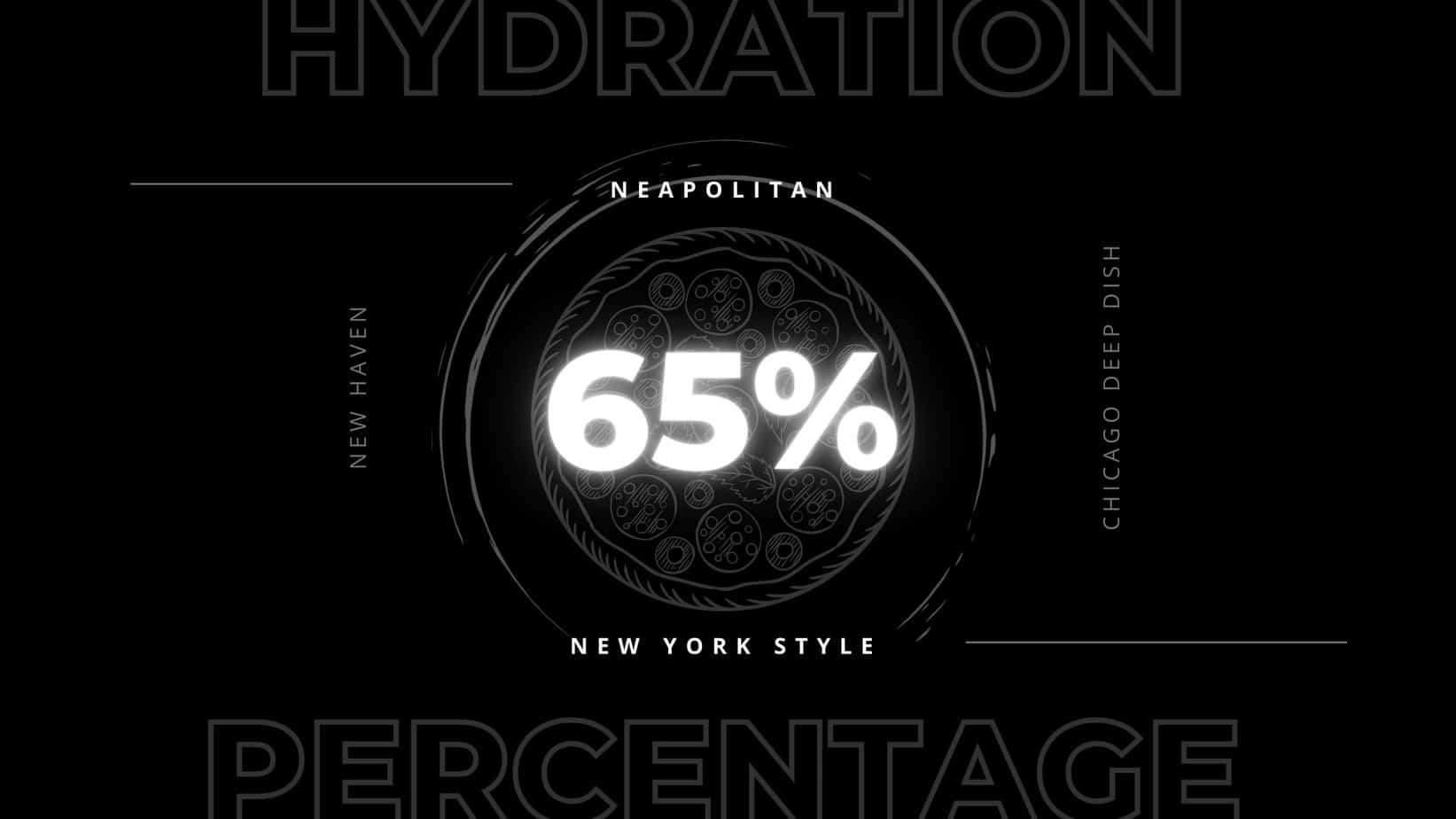
7 Hydration Percentages by Pizza Style that Actually Make the Best Pizza
the PROs
Making a pizza is all about getting your pizza dough to have just the right amount of hydration. If you’re looking to get the best results this guide can help you find the specific pizza dough hydration according to your desired pizza style. Let’s check it out!
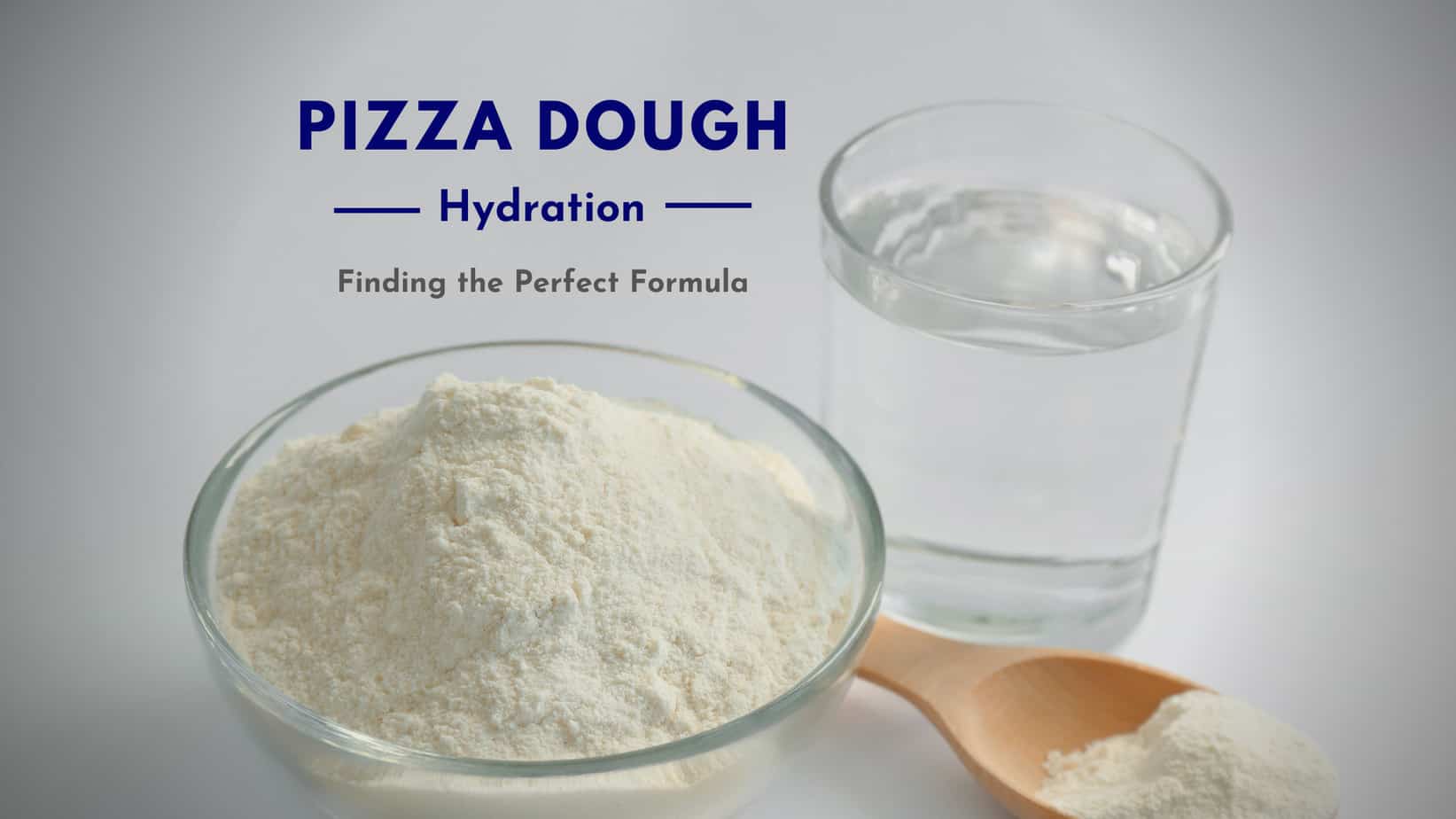
Pizza Dough Hydration – Mastering the Art of the Perfect Crust!
the PROs
If you’re looking to get the best results, this scientifically proven formula to calculate, manage and control pizza dough hydration will get you on track to become the best pizza baker! So, let’s get started.

Here’s the Secret to Making the Perfect Crispy Pizza Crust
the PROs
Are you tired of making homemade pizza that has a crust that never seems to get crispy enough? We’ve got the answer to this problem! Our assortment of tips and methods will solve your problem once and for all. You’ll get better results in how to make a pizza crust crispy and crunchier than ever! So, let’s find out!
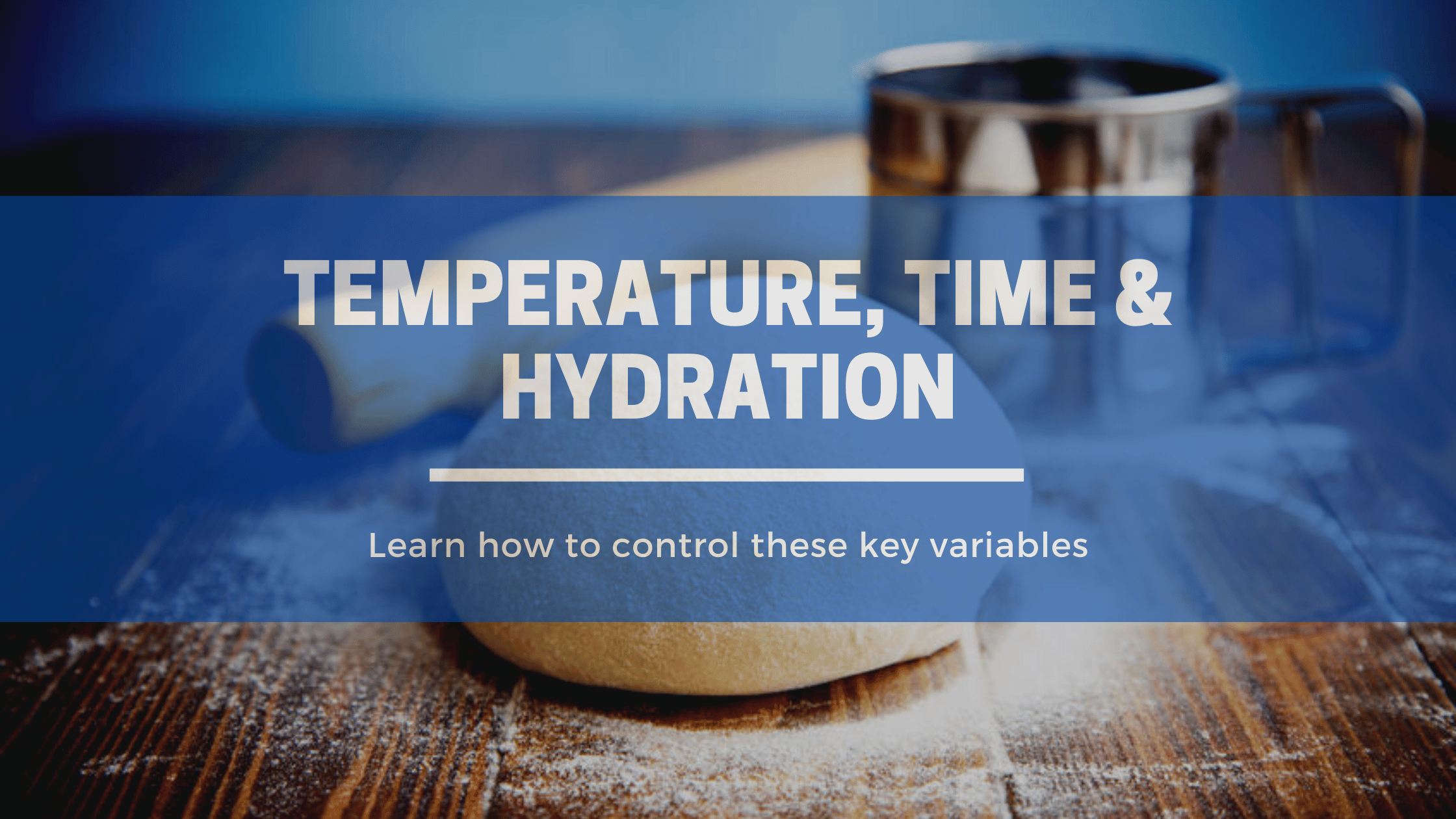
How to Control Temperature, Time, and Hydration for Pizza Dough
the PROs
Learn how temperature, time and hydration affect pizza dough and how you can control them.
The Last Slice
So now that you know the importance of water in pizza making, what is the best water for pizza dough, and how to manage temperature, volume, and water quality.
You should be able to troubleshoot your pizza dough and determine if anything went wrong or if you developed a formula that gives you the desired results.
By tasting your pizza, you can reveal how water affected the overall pizza structure and flavor; and if it met your expectations.
Test the best water for pizza dough by looking in detail at the hydration percentage that worked best for you.
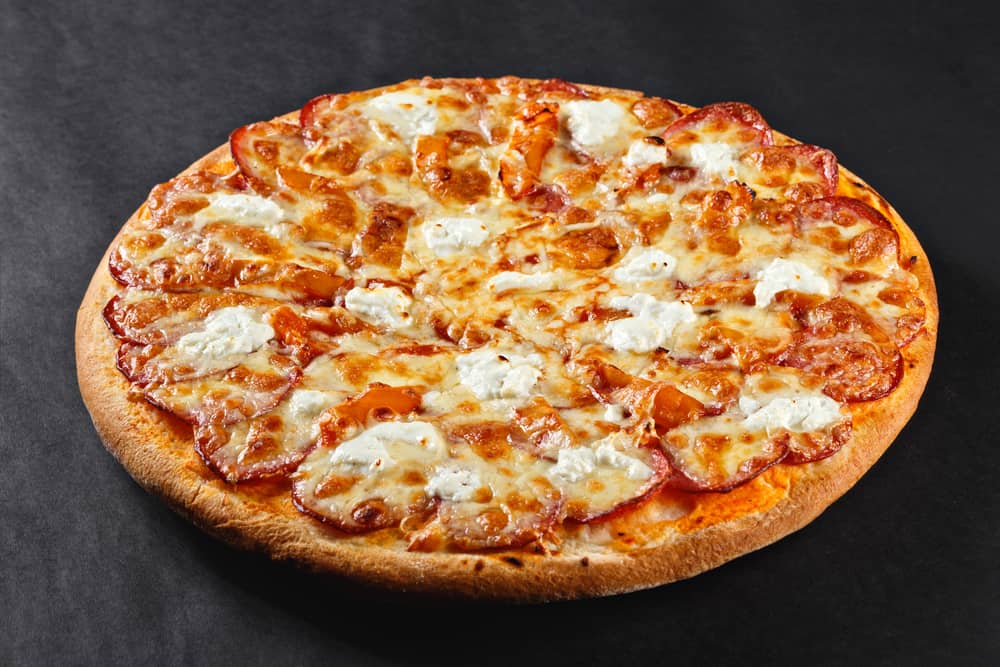
So, what do you need to look for? Let’s point it out:
Flavor
Does the crust have any flavor without cheese, sauce, or any of the toppings?
If the yeast fermented properly, the crust should have a subtle aroma and sublime bready, yeasty flavor.
Crust
Did the crust rise enough to have an identifiable rim?
If the rim is flat, the hydration was too low.
Does the crust have any bubbles?
Examine the inside of the crust and look for air pockets. High hydration will give you more pockets, while low hydration will not provide any pockets at all.
How is the overall structure?
More water will give you a soggy and chewy crust, while less water will provide a drier and stiffer crust.
Appearance
What is the color of the crust?
If the pizza dough had the correct hydration, the crust should look puffy and with a cream color and little dark spots.
If you haven’t done so, try it, experiment with different hydration percentages, and see how water affects your pizza dough under your circumstances and expectations.
At the end of the day, it’s your pizza, you did it, so it should be the best for you!
So, what do you think?
Is your water the best water for pizza dough?
Does water really make a difference?
Does it reveal how good your pizza is?
Let us know; we would love to learn more.
Check Amazon’s Pizza-Making Must-Haves
Why have two pizza peels when you can only have one. This pizza peel surpasses the benefits of wood peels with the convenience of a metal peel. It's made entirely from anodized aluminum for a lightweight design that's incredibly durable, too. It's designed to be used frequently in high-heat pizza ovens.
The Etekcity Lasergrip 800 Digital Infrared Thermometer is a versatile and reliable tool for accurate temperature measurements. Its non-contact design allows you to measure temperatures from a distance, making it safe and hygienic for various applications. With a wide temperature range of -58°F to 1382°F (-50°C to 750°C), this infrared thermometer is perfect for both everyday cooking needs and professional uses.
The built-in laser pointer helps you target the specific area you want to measure, ensuring precision and consistency. Whether you're grilling, cooking, or performing household maintenance, the Etekcity Lasergrip 800 provides fast and accurate temperature readings with ease.
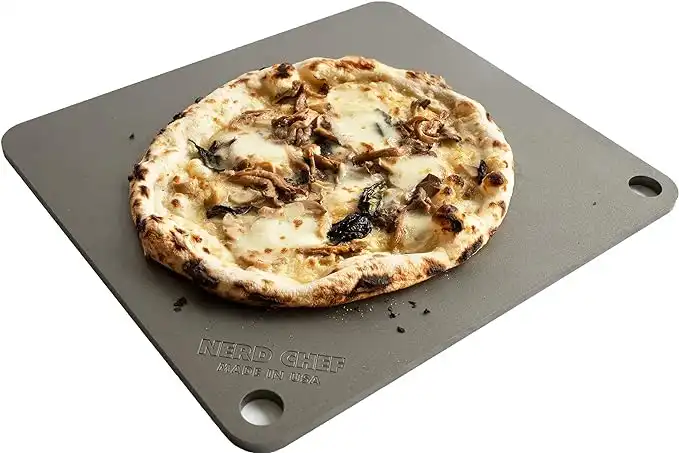 NerdChef Steel Stone
NerdChef Steel Stone
Making great crusts traditionally requires a 700-1000F wood-fired oven. Nerdchef Steel Stone replicates that performance in a home oven with its super-high heat transfer ability - transferring heat energy 20 times faster than ceramic. It creates beautiful and crispier crusts, gorgeous blistering throughout, and it cooks faster.
The Chef's flour is a general-purpose, high gluten flour that works well for many recipes. "Tipo 00" refers to how refined the flour is. Chef's Flour is best for those who want to bake in their traditional home oven up to 500 degrees Fahrenheit!
Enjoy!
Not a PRO? Not a Problem!
Take a pizza class to bring your pizza skills to the next level,
so you can be a PRO!
Related Posts

Costco Pizza Delivery: Find How You Can Get It Now!
the PROs
People go to Costco’s food court for many different reasons, but the cheesy slice of pizza they serve is among …
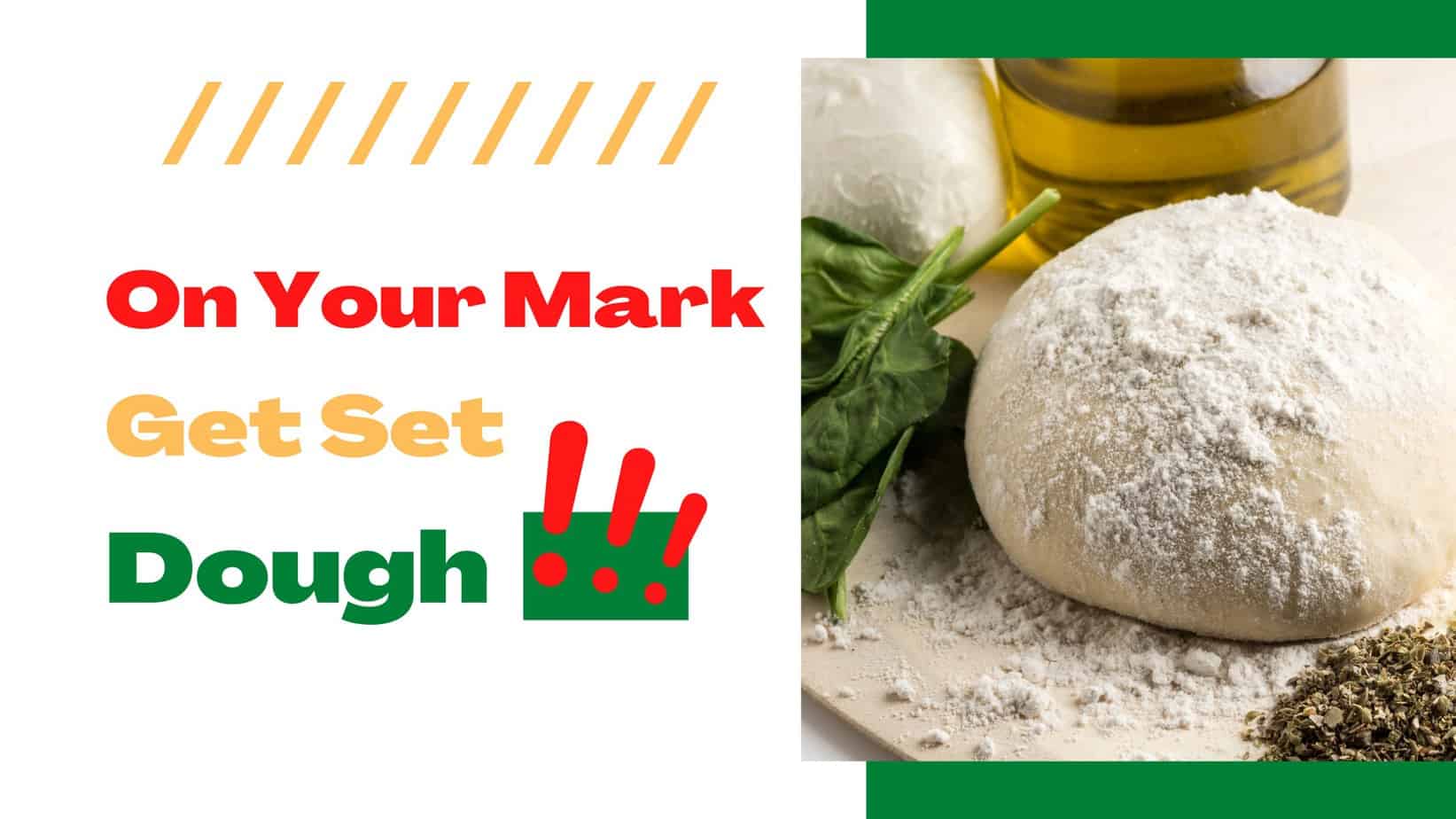
Pizza for Beginners: Don’t Buy Pizza, Make It! Here’s How to Get Started!
the PROs
You have this idea that you want to make pizza at home as opposed to ordering it, but where do you start? Don’t worry! Here you will find answers and directions to all your questions.

Pizza Toppings Under Cheese or Over Cheese? [Why the Order Matters]
the PROs
Is Pizza Cheese on Top or Bottom? Hey pizza lovers, are you wondering if you should layer pizza toppings under …
Newsletter
Subscribe to our Recipe of the Week newsletter and receive our partners’ latest recipes, tips, and discount offers.
Keep in Touch!
